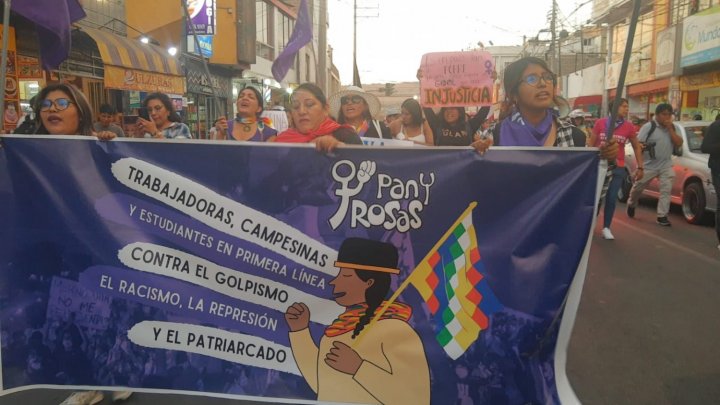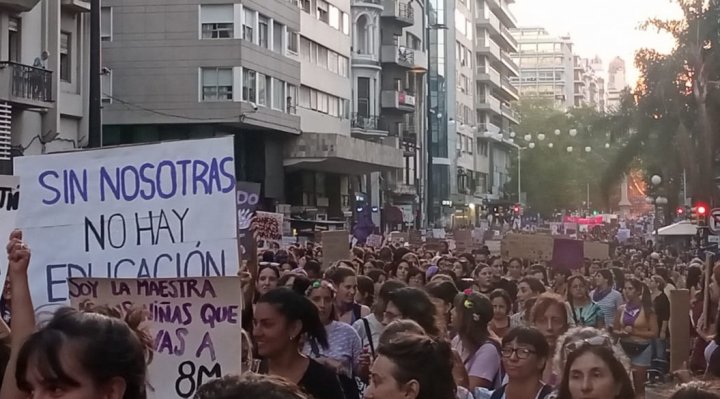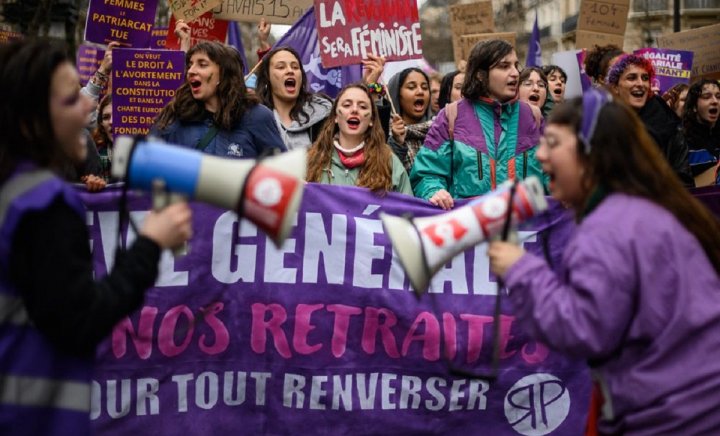Bread and Roses is an international feminist socialist movement. We participate in the thousands of daily struggles of the feminist movement across the globe. On this International Women’s Day, Pan y Rosas was part of the massive March 8 mobilizations in cities across Europe and the Americas.
México
Hundreds of thousands of women marched along the extensive Paseo de la Reforma in Mexico City. They demanded an end to violence against women, justice for the victims of femicide, and the legalization of abortion in all Mexican states. This impressive demonstration in the streets has forced President López Obrador to rapidly reverse his anti-feminist discourse of previous years and declare that the “Fourth Transformation,” his political party, is feminist. More than a thousand demonstrators marched with Pan y Rosas, which participated in a bloc with militants and union organizations.
France
This year, 8M coincided with a huge general strike that has been going on for months against the pension reform that President Emmanuel Macron is attempting to implement, especially affecting women. The general strike on Tuesday, March 7 was even bigger than the previous one.
The streets were full of comrades participating in the strike, but also extending their demands towards other struggles against racism, xenophobia and the precariousness of labor, which falls heavily on immigrant women. In Paris, a column of more than a thousand demonstrators marched with the socialist feminists of Du Pain et des Roses, but they were also mobilized in other French cities such as Bordeaux and Toulouse.
The Spanish State
8M got off to a strong start with massive student demonstrations throughout the country. Pan y Rosas participated in the demonstrations in Madrid and Zaragoza. In Barcelona,the Catalonian group, Pa i Roses, marched. The feminist student strike emptied classrooms in several cities. In Catalonia, a general strike has been called.
The enormous energy from Bread and Roses was felt, with comrades repudiating the multi-layered violences of patriarchal capitalism, violence against women, racist violence, homophobia, and also the violence of precarious labor, which affects women with particular viciousness. They made a strong repudiation of the rancid extreme right that seeks to capitalize on the discontent of the population and denounced the policy of the “progressive” government and the trap of “punitivism,” which only strengthens the institutions of the capitalist patriarchal state.
Most importantly, the masses denounced the war, which has put in motion the militarization of the European imperialisms. The comrades denounced the policy of the PSOE-Podemos government, which calls itself progressive but is taking part in this war effort with vigor.
Madrid
Argentina
Thousands of demonstrators demanded justice for the victims of violence against women in cities throughout the country. It is clear that the struggle for the right to abortion in Argentina marked a before and after for the feminist movement. Although the official policy, after the approval of the abortion law, was to remove the women’s movement from the streets, this has not prevented 8M from mobilizing tens of thousands of protestors into the streets. Pan y Rosas demonstrated in several cities across the country, among them Neuquén, Jujuy, Mendoza, La Plata, Bahía Blanca, and many more.
Pan y Rosas was in full force in Buenos Aires, in a mobilization called by the Assembly for the Right to Abortion, alongside the Frente de Izquierda-Unidad and other feminist and left-wing groups. There was also another mobilization in the city called by Kirchnerist and pro-government organizations. Women from various walks of lives and unions participated. The teachers of Ademys, women workers from the worker-controlled printing plant MadyGraf, and women who have been fighting for land to live on like those in the Guernica Assembly, women from the organizations of the unemployed, high school and university students, state workers from the Ministry of Labor, and many more. Myriam Bregman, national deputy of the PTS-FITU and pre-candidate for president, marched amongst the masses with Pan y Rosas.
Peru
In Peru, overwhelmed with conflict, delegations of peasant and working women from the Puno region marched through the streets of Lima on International Women’s Day. They held posters stating, “Mom: I went out to defend my homeland, if I do not return, I went with her,” in reference to the repression and murders that the coup government of Dina Boluarte has been unloading on the mobilizations of the Peruvian people.

Germany
In Germany, there were mobilizations in Berlin and other cities. The comrades who participated in Brot und Rosen emphasized denouncing the war policy of Olaf Scholz’s government, which directs ample resources to a reactionary war that only has negative consequences for the workers and the people. They expressed this connection with the cry of “Kindergartens not war.”
Chile
In Chile, a new march was called by the Coordinadora 8M, which was seen in several cities of the country in commemoration of a new March 8. This was the first 8M seen by Gabriel Boric’s government, in the midst of several scandals and with the demands of the feminist movement still unfinished.
Teresa Flores participated with a policy independent of the current government, which is keeping the demands of the women’s movement on hold. She marched together with the Coordination of Women and Popular Dissidents, an independent bloc with more than 500 demonstrators that ended in front of the Palacio de La Moneda.
Uruguay
In Uruguay, hundreds of thousands mobilized against patriarchal violence, femicides, harassment, discrimination in the workplace, job insecurity, feminized poverty and the criminalization of protest. A feminist tide invaded the streets, squares and public spaces in more than 40 locations throughout the country. Flags and lilac scarves, painted faces, and T-shirts with slogans were seen everywhere.
Early in the morning, in Montevideo, groups of women gathered around Plaza Libertad. There they assembled posters and banners, painted themselves, chanted songs and prepared for the march in the context of the general strike in the public administration called by the PIT-CNT trade union center.

Originally published in Spanish on March 8, in La Izquierda Diario, Mexico
Translation by Kimberly Ann











